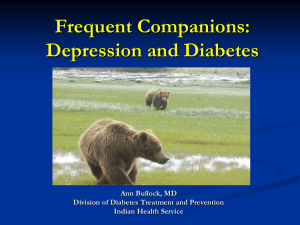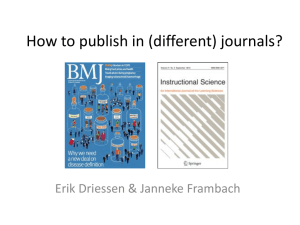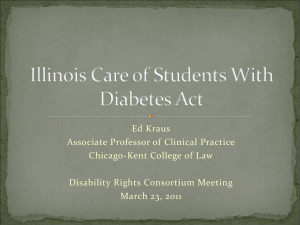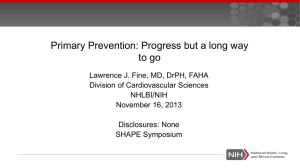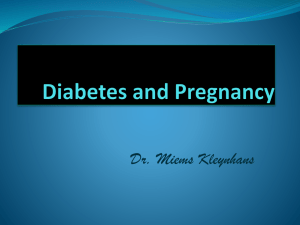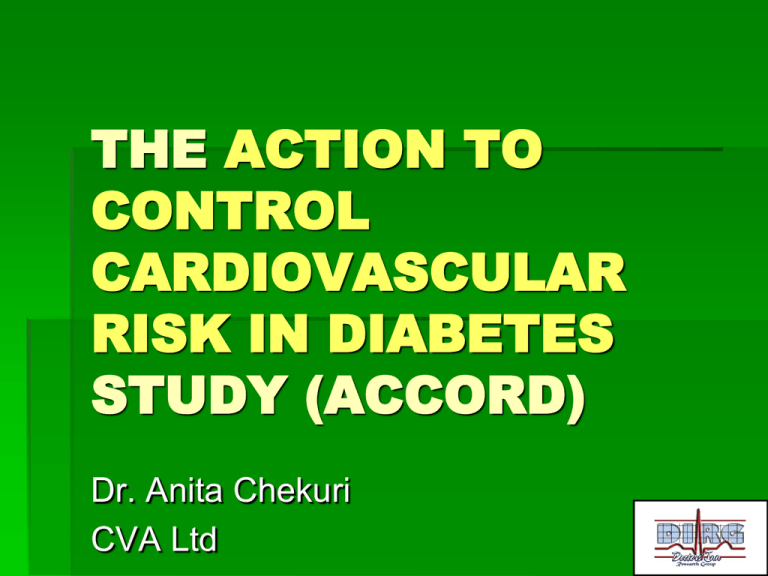
THE ACTION TO
CONTROL
CARDIOVASCULAR
RISK IN DIABETES
STUDY (ACCORD)
Dr. Anita Chekuri
CVA Ltd
Background
Epidemiologic analyses suggest that the risk for CVD
in patients with diabetes increases in a graded fashion
with increases HbA1c, BP, LDL, and TG and with a
decrease in HDL.
Diabetics without Hx of MI have same risk of a
coronary event as do non-diabetics with previous MI
To determine whether CVD event rates can be reduced
in patients with T2DM who are at high risk for CVD
events by intensively targeting 3 important CVD risk
factors: hyperglycemia, dyslipidemia, and elevated
blood pressure.
Buse J. Action to Control Cardiovascular Risk in Diabetes (ACCORD) Trial: Design and Methods
The American Journal of Cardiology 2007;99:21-33.
Haffner SM, Lehto S, Ronnemaa T, Pyöräla K, Laakso M. Mortality from coronary heart disease in subjects with type 2
diabetes and in nondiabetic subjects with and without prior myocardial infarction. N Engl J Med 1998;339:229-234
2 X 2 Factorial Design
BP trial
Lipid trial
Glycaemic trial
SBP<110
mmHg
SBP<140
mmHg
Group
A
Group
B
Total
HbAIC < 6%
1178
1193
1383
1374
5128
HbAIC 7.07.9%
1184
1178
1370
1391
5123
2362
2371
2753
2765
Total
4733
5518
Buse J. Action to Control Cardiovascular Risk in Diabetes (ACCORD) Trial: Design and Methods
The American Journal of Cardiology 2007;99:21-33.
10251
Eligibility
Stable Type 2 Diabetes for 3+ months
A1C >7.5% AND <9% (more meds) OR <11% (fewer meds)
Age 40-79 + previous CVD events OR
Age 55-79 with:
anatomical ASCVD, albuminuria, LVH OR
> 2 CVD risk factors (dyslipidemia, hypertension, smoking, obesity)
BMI < 45; Cr < 1.5 (133 uM)
No frequent/recent serious hypoglycemia
Able/willing to take insulin, do glucose monitoring
Eligible for BP or Lipid Trial
LDL 60-180 mg/dl
HDL < 55 mg/dl (women, blacks), < 50 (all others)
TG <750 (not on lipid therapy) or <400 (on lipid therapy)
The ACCORD study group. Effects of intensive glucose lowering in type 2 diabetes. N Engl J Med 2008;358:2545-2559.
The ACCORD Study Group. Effects of combination lipid therapy in type 2 diabetes mellitus. N Engl J Med 2010. DOI:
10.1056/NEJMoa1001282
ACCORD Glycaemic
Control Arm
Dr. Anita Chekuri
CVA Ltd
Background
An increase of 1% in the HbAIC is associated
with an increase of 18% in the risk of
cardiovascular events1
Determine whether therapeutically targeting
normal HbAIC levels (< 6.0%) would reduce
the rate of cardiovascular events, as compared
to targeting HbAIC from 7.0 to 7.9%2
The finding of higher mortality in the intensivetherapy group led to termination of the
intensive regimen 17 months before the
scheduled end of the study2
1Selvin
E, Marinopoulos S, Berkenblit G, et al. Meta-analysis: glycosylated hemoglobin and cardiovascular disease in
diabetes mellitus. Ann Intern Med 2004;141:421-431
2The
ACCORD study group. Effects of intensive glucose lowering in type 2 diabetes. N Engl J Med 2008;358:25452559.
Randomization
BP trial
Lipid trial
Glycaemic trial
SBP<110
mmHg
SBP<140
mmHg
Group
A
Group
B
Total
HbAIC < 6%
1178
1193
1383
1374
5128
HbAIC 7.07.9%
1184
1178
1370
1391
5123
2362
2371
2753
2765
Total
4733
5518
10251
The ACCORD study group. Effects of intensive glucose lowering in type 2 diabetes. N Engl J Med 2008;358:2545-2559.
Outcomes
Primary
First occurrence of nonfatal MI, nonfatal Stroke, or
death from CV disease.
Secondary
Death from any cause.
Also measured the effect of the intervention on
microvascular disease, hypoglycemia, cognition,
and quality of life.
Intensive glycaemic control arm terminated in
3.5 years (instead of 5.6 years as planned for)
The ACCORD study group. Effects of intensive glucose lowering in type 2 diabetes. N Engl J Med 2008;358:2545-2559.
Baseline Characteristics
Age
Women
Median DM
Duration
Previous CVD
Event
White/Black
Current Smoker
Mean BMI
Mean SBP/DBP
Mean/Median A1C
Mean FG
Mean LDL / HDL
Intensive
(N = 5128)
Standard
(N = 5123)
62.2
38.7
62.2
38.4
10
10
35.6
34.8
64.4/19.7
14.3
32.2
136.2/74.8
8.3 / 8.1
175
105 / 47
64.5/18.9
13.7
32.2
136.5/75.0
8.3 / 8.1
176
105 / 47
The ACCORD study group. Effects of intensive glucose lowering in type 2 diabetes. N Engl J Med 2008;358:2545-2559.
Median Glycated Hemoglobin Levels at Each Study Visit
The Action to Control Cardiovascular Risk in Diabetes
Study Group. N Engl J Med 2008;358:2545-2559
Adverse Events, Clinical Measures, Tobacco Use, and Use of Nonglycemic
Medication after Randomization
The Action to Control Cardiovascular Risk in Diabetes
Study Group. N Engl J Med 2008;358:2545-2559
Primary and Secondary Outcomes
The Action to Control Cardiovascular Risk in Diabetes
Study Group. N Engl J Med 2008;358:2545-2559
Kaplan-Meier Curves for the Primary Outcome and Death from Any Cause
The Action to Control Cardiovascular Risk in Diabetes
Study Group. N Engl J Med 2008;358:2545-2559
Hazard Ratios for the Primary Outcome and Death from Any Cause in Prespecified
Subgroups
The Action to Control Cardiovascular Risk in Diabetes
Study Group. N Engl J Med 2008;358:2545-2559
Observations
Targeting HbAIC levels below 6.0% increased the rate
of death from any cause after a mean of 3.5 years
Magnitude of reduction
Speed of reduction
Adverse drug interactions at high doses
Rate of hypoglycaemia
The ACCORD study group. Effects of intensive glucose lowering in type 2 diabetes. N Engl J Med 2008;358:2545-2559.
Number of Participants With One or
More Severe Hypoglycemia Events
Requiring Medical Assistance (n and %)
Intensive Group
Standard Group
# Events **
n
%
n
%
1
400
7.8
130
2.5
2
82
1.6
34
0.7
3 to 5
43
0.8
10
0.2
>5
6
0.1
0
0
**Cumulative number of events
The ACCORD study group. Effects of intensive glucose lowering in type 2 diabetes. N Engl J Med 2008;358:2545-2559.
Mortality By Treatment Group and
Severe Hypoglycemia
Overall
Intensive
Glycemia
1.4% / year
Standard
Glycemia
1.1% / year
Hazard
Ratio
(257 Deaths)
(203 Deaths)
1.22 (1.01, 1.46)
Never
Experienced a
Hypoglycemic Event
Experienced
Hypoglycemic Event
1.3% / year
2.8% / year
(223 Deaths)
1.1% / year
(186 Deaths)
(34 Deaths)
4.9% / year
(17 Deaths)
1.24 (1.02, 1.50)
0.54 (030, 0.96)
Mortality Higher in
Intensive Group
Mortality Higher in
Standard Group
(95% CI)
Interaction P < 0.01
The ACCORD study group. Effects of intensive glucose lowering in type 2 diabetes. N Engl J Med 2008;358:2545-2559.
Can we blame it all on
hypoglycaemia?
Intensive Strategy
Intensive Strategy
Higher Rates of
Hypoglycemia
Higher Mortality
Higher Rates of
Hypoglycemia
And can ACCORD
distinguish these?
Higher Mortality
No!
The ACCORD study group. Effects of intensive glucose lowering in type 2 diabetes. N Engl J Med 2008;358:2545-2559.
Observations
Targeting HbAIC levels below 6.0% increased the rate
of death from any cause after a mean of 3.5 years
Magnitude of reduction
Speed of reduction
Rate of hypoglycaemia
Adverse drug interactions at high doses
Longer time duration increases benefits of mortality
from non-fatal MI, but also increases risk of death
The ACCORD study group. Effects of intensive glucose lowering in type 2 diabetes. N Engl J Med 2008;358:2545-2559.
Kaplan-Meier Curves for the Primary Outcome and Death from Any Cause
The Action to Control Cardiovascular Risk in Diabetes
Study Group. N Engl J Med 2008;358:2545-2559
Observations
Targeting HbAIC levels below 6.0% increased the rate
of death from any cause after a mean of 3.5 years
Magnitude of reduction
Speed of reduction
Rate of hypoglycaemia
Adverse drug interactions at high doses
Longer time duration increases benefits of mortality
from non-fatal MI, but also increases risk of death
The ACCORD study group. Effects of intensive glucose lowering in type 2 diabetes. N Engl J Med 2008;358:2545-2559.
ACCORD Lipid Control
Arm
Dr. Anita Chekuri
CVA Ltd
Background
To investigate whether combination
therapy of statin (lower LDL) + fibrate
(raise HDL, lower TG), as compared to
statin monotherapy was superior in
reducing rate of CV events in high risk
Type 2 diabetics
The ACCORD Study Group. Effects of combination lipid therapy in type 2 diabetes mellitus. N Engl J Med 2010. DOI:
10.1056/NEJMoa1001282
Method
5518 high risk for CV events on
Simvastatin started at randomization
Treatment group – add fenofibrate at 1
month- 2765
Placebo group- 2753
Follow-up- 4.7 years
The ACCORD Study Group. Effects of combination lipid therapy in type 2 diabetes mellitus. N Engl J Med 2010. DOI:
10.1056/NEJMoa1001282
Randomization
BP trial
Lipid trial
Glycaemic trial
SBP<110
mmHg
SBP<140
mmHg
Group
A
Group
B
Total
HbAIC < 6%
1178
1193
1383
1374
5128
HbAIC 7.07.9%
1184
1178
1370
1391
5123
2362
2371
2753
2765
Total
4733
5518
10251
The ACCORD Study Group. Effects of combination lipid therapy in type 2 diabetes mellitus. N Engl J Med 2010. DOI:
10.1056/NEJMoa1001282
Outcomes
Primary:
First occurrence of nonfatal MI, nonfatal Stroke, or
death from CV disease
Secondary:
Primary plus revascularization or hospitalization for
CCF (expanded macrovascular outcome)
Combination of fatal coronary event, nonfatal MI, or
unstable angina (major coronary disease events)
Death from any cause
Hospitalization due to HF
The ACCORD Study Group. Effects of combination lipid therapy in type 2 diabetes mellitus. N Engl J Med 2010. DOI:
10.1056/NEJMoa1001282
Results
Mean LDL decrease of
100.0 to 81.1 in Fenofibrate group
101.1 to 80.0 in placebo group
The ACCORD Study Group. Effects of combination lipid therapy in type 2 diabetes mellitus. N Engl J Med 2010. DOI:
10.1056/NEJMoa1001282
Lipid Values
The ACCORD Study Group. N Engl J Med 2010;10.1056/NEJMoa1001282
Prespecified Primary and Secondary
Outcomes
The ACCORD Study Group. N Engl J Med 2010;10.1056/NEJMoa1001282
Kaplan-Meier Analyses of the Primary Outcome, Expanded Macrovascular Outcome,
and Death
The ACCORD Study Group. N Engl J Med 2010;10.1056/NEJMoa1001282
Hazard Ratios for the Primary Outcome in Prespecified Subgroups
The ACCORD Study Group. N Engl J Med 2010;10.1056/NEJMoa1001282
Observations
No significant difference in primary
outcome between groups
In subgroup analysis, sex difference was
significant. Men seemed to benefit from
Fenofibrate.
Suggestion of heterogenisity with
baseline TG and HDL levels.
The ACCORD Study Group. Effects of combination lipid therapy in type 2 diabetes mellitus. N Engl J Med 2010. DOI:
10.1056/NEJMoa1001282
Thank You
Any Questions?.........


